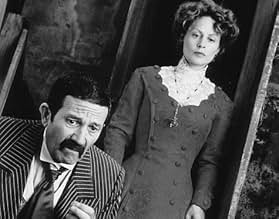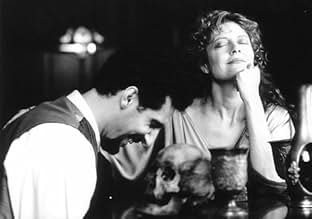VALUTAZIONE IMDb
6,0/10
1752
LA TUA VALUTAZIONE
Aggiungi una trama nella tua linguaA turn-of-the-20th-century theatre repertory company rejects the latest project of their beloved playwright Tuccio, kicking off a saga of intrigue surrounding the influential critic Bevalaqu... Leggi tuttoA turn-of-the-20th-century theatre repertory company rejects the latest project of their beloved playwright Tuccio, kicking off a saga of intrigue surrounding the influential critic Bevalaqua and star Celimene.A turn-of-the-20th-century theatre repertory company rejects the latest project of their beloved playwright Tuccio, kicking off a saga of intrigue surrounding the influential critic Bevalaqua and star Celimene.
- Premi
- 1 candidatura
Henri Béhar
- Pitou
- (as Henri Behar)
Timothy Doyle
- Aristocrat #1
- (as Timothy Doyle)
Trama
Lo sapevi?
- QuizCinematographer Harris Savides (1957-2012) has an uncredited part as a theatre patron who walks up to John Turturro's character Tuccio, the resident playwright of the theatre, and says to him: "Did you see the play? I hated it.".
- ConnessioniReferenced in Moesha: Mis-directed Study (1999)
Recensione in evidenza
Superficially about love (isn't everything?) this effort really concerns itself with a recurring question in theater: how important are the actors?
In recent years, there have been a dozen or so movies by actors that deal with this and insist they are paramount. The most entertaining (in a camp way) is "Wag the Dog," perhaps the most intelligent "Vanya on 42nd St" and the most interesting Branagh's "Midwinter's Night." The most financially successful is "Shakespeare in Love."
This is not a sex farce, nor about love. That's all just grist for motion. Here we have a message from the "puppets," underscored by pleasant framing of the film by puppets. What the writers of this work have done is suggest that the life of any play comes from the lives of the actors. This is in contrast to plays written by genius playwrights like Ibsen, that are merely "performed." For this troupe to have to participate in such an enterprise is seen as hell.
Thus we have their (thinly distilled) lives appear on the stage. Along the way we have an audience that is purely incidental since they don't know what's good anyway. We have the theater owner who likewise is ignorant, but married to a failed thespian who suspects. We have the all-important critic whose real interesting characteristic is not his flamboyant gayness, but his views on art: he values writing, values the fulfillment of the author's intent. So he is particularly vulnerable to being abused. The character is a parody of Wilde who came down strongly on this controversy.
We have the vain celebrity (Sarandon) who does not have the commitment to the art of acting. She briefly tempts our author who really in his heart loves and respects the actors, here represented by the head of the troupe. Sarandon has a speech where she claims she loves the art, but it is clear she loves herself only. Is she a parody on Ellen Terry? Walkin and Sarandon clearly as actors believe in the supremacy of the actor, so in playing the "bad guys" they overly ham it up so that we know where they really stand. In so doing, they undercut their purported honor somewhat. Rather unsettling, especially so since they are amusing at it.
And we also have the troupe itself. They do double duty here: first showing honest commitment. Second providing the material that appears in the play, each representing a distinct stereotype. Wheels turn, people love and not, die and not. This strange crew (and any like it) we are told is worth it despite the strangeness. Along the way many writers are quoted from the Greeks through Chekhov. This is not new stuff, as noted above, but once you know what it is about it is well enough done. However, there is only so much reward one can get, the work can only go but so deep when it is turned over to actors. See where I stand?
If you come looking for a sex farce where the theater is incidental, your mistake will lead you to disappointment as it clearly did many who commented before me.
In recent years, there have been a dozen or so movies by actors that deal with this and insist they are paramount. The most entertaining (in a camp way) is "Wag the Dog," perhaps the most intelligent "Vanya on 42nd St" and the most interesting Branagh's "Midwinter's Night." The most financially successful is "Shakespeare in Love."
This is not a sex farce, nor about love. That's all just grist for motion. Here we have a message from the "puppets," underscored by pleasant framing of the film by puppets. What the writers of this work have done is suggest that the life of any play comes from the lives of the actors. This is in contrast to plays written by genius playwrights like Ibsen, that are merely "performed." For this troupe to have to participate in such an enterprise is seen as hell.
Thus we have their (thinly distilled) lives appear on the stage. Along the way we have an audience that is purely incidental since they don't know what's good anyway. We have the theater owner who likewise is ignorant, but married to a failed thespian who suspects. We have the all-important critic whose real interesting characteristic is not his flamboyant gayness, but his views on art: he values writing, values the fulfillment of the author's intent. So he is particularly vulnerable to being abused. The character is a parody of Wilde who came down strongly on this controversy.
We have the vain celebrity (Sarandon) who does not have the commitment to the art of acting. She briefly tempts our author who really in his heart loves and respects the actors, here represented by the head of the troupe. Sarandon has a speech where she claims she loves the art, but it is clear she loves herself only. Is she a parody on Ellen Terry? Walkin and Sarandon clearly as actors believe in the supremacy of the actor, so in playing the "bad guys" they overly ham it up so that we know where they really stand. In so doing, they undercut their purported honor somewhat. Rather unsettling, especially so since they are amusing at it.
And we also have the troupe itself. They do double duty here: first showing honest commitment. Second providing the material that appears in the play, each representing a distinct stereotype. Wheels turn, people love and not, die and not. This strange crew (and any like it) we are told is worth it despite the strangeness. Along the way many writers are quoted from the Greeks through Chekhov. This is not new stuff, as noted above, but once you know what it is about it is well enough done. However, there is only so much reward one can get, the work can only go but so deep when it is turned over to actors. See where I stand?
If you come looking for a sex farce where the theater is incidental, your mistake will lead you to disappointment as it clearly did many who commented before me.
I più visti
Accedi per valutare e creare un elenco di titoli salvati per ottenere consigli personalizzati
- How long is Illuminata?Powered by Alexa
Dettagli
Botteghino
- Lordo Stati Uniti e Canada
- 840.134 USD
- Fine settimana di apertura Stati Uniti e Canada
- 53.264 USD
- 8 ago 1999
- Lordo in tutto il mondo
- 866.865 USD
- Tempo di esecuzione1 ora 59 minuti
- Mix di suoni
- Proporzioni
- 1.85 : 1
Contribuisci a questa pagina
Suggerisci una modifica o aggiungi i contenuti mancanti

Divario superiore
By what name was Illuminata (1998) officially released in Canada in English?
Rispondi





























